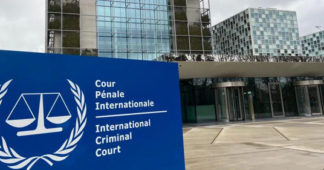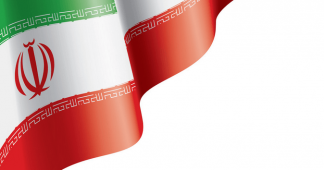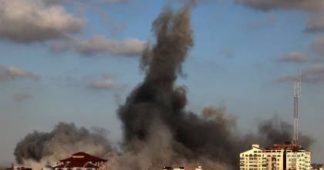Bolivia has severed diplomatic relations with Israel, and Colombia, Chile, and Honduras have all recalled their ambassadors. Latin America is leading the way in opposing Israel’s war on Gaza.
By Kurt Hackbarth
Nov 12, 2023
That same day, President Gustavo Petro announced that he was recalling Colombia’s ambassador to Israel. “If Israel does not stop its massacre of the Palestinian people, we cannot be there,” he tweeted concisely. Petro, indeed, has been one of the continent’s most vocal critics of Israeli actions over the last several weeks. “If we have to suspend foreign relations with Israel, we will suspend them,” he wrote on October 15. “We do not support genocides.” Expanding on the point in a subsequent tweet, he added: “It’s called genocide, and it’s done to remove the Palestinian people from Gaza and appropriate it. The head of the government that commits this genocide is a criminal against humanity. His allies cannot speak of democracy.”
The revolts of Bolivia and Colombia on the left side of Latin America’s “second wave” of progressive governments were one thing. But then President Gabriel Boric — decidedly more of a moderate, especially in foreign affairs — announced that Chile, too, was recalling its ambassador. “Chile energetically condemns and observes with great concern that these military operations — which at this point of their development constitute a collective punishment of the Palestinian civilian population in Gaza — do not respect fundamental norms of international law,” he wrote, “as demonstrated by the over eight thousand civilian victims, mostly women and children.”
In a separate tweet on that same October 31, he was more succinct: “Nothing justifies the barbarity in Gaza. Nothing.” Three days later, on November 3, Honduras announced that it, too, was recalling its ambassador.
You’re Either With Us or With the Terrorists
Other countries in the region have since offered support for these stances with statements of their own condemning Israeli aggression. “Nothing justifies the violation of international humanitarian law and the obligation to protect the civilian population in armed conflicts, without distinction,” wrote the foreign ministry of Argentina in a communiqué, adding a special condemnation of the Israeli bombardment of the Jabalia refugee camp.
After criticizing as “unacceptable” the United States’ veto of a Security Council resolution (proposed by Brazil) that would have called for a humanitarian pause for the entry of vital supplies to Gaza, Mexico has raised its rhetoric a couple of notches: according to Alicia Buenrostro, its representative at the United Nations, Israel’s indiscriminate attacks on civilians “could constitute war crimes.” For his part, President Luiz Inácio Lula da Silva of Brazil has echoed the cry heard at marches up and down the region in recent weeks: “This isn’t a war; it’s a genocide.”
Israel’s reaction to all of this has been depressingly predictable. It accused Bolivia of “capitulation to terrorism and to the ayatollah regime in Iran” before attempting to downplay the cutting of diplomatic ties by grousing that they never had much of a relationship in the first place (Bolivia had previously broken relations between the two countries in 2009, also over Israeli conduct in Gaza). As for Colombia and Chile, Israel’s foreign ministry said that it “expects” them “to support the right of a democratic country to protect its citizens . . . and not align themselves with Venezuela and Iran in support of Hamas terrorism.”
In the case of Mexico, even Andrés Manuel López Obrador (AMLO)’s mild statements of neutrality in the days following October 7 were enough to bring on a scolding Israeli statement that “deeply lamented” the country’s failure to “adopt a more energetic response” to the situation. Israeli ambassador Einat Kranz Neiger then took to the airwaves to insist that the Mexican president’s posture was “out of place” because “not taking a side in this case is supporting terrorism.” But the pressure tactics backfired, with AMLO hardening his position on October 18 to call for a cease-fire.
Who’s the Democracy?
Rather than an innate attraction to terrorism, as this clumsy bombast would have one believe, sympathy for the Palestinian cause in Latin America can be explained by two fundamental reasons: a historical sympathy for oppressed and colonized peoples, along with Israel’s own history in the region as a proxy for US interests.
Israel has supported a laundry list of the worst names in recent Latin American history, including Rafael Trujillo, Augusto Pinochet, Luis García Meza, Efraín Ríos Montt, Anastasio Somoza, and Jorge Rafael Videla. In effect, it has acted as a convenient wrap-around for inconvenient restrictions, as when it trained, armed, and provided intelligence to the Pinochet dictatorship in Chile — in the process, becoming its largest arms supplier — during a time of US embargo. It also kept the arms flowing to Nicaragua and El Salvador during similar embargoes there, and in the case of Honduras during the military regimes of the ’70s, provided advanced American weaponry despite US laws banning third-country transfers of military equipment.
It provided “counterinsurgency” training to Costa Rican police at a time when that was also banned in the United States, provided arms and other materiel to the military junta in Argentina despite the fact that a substantial number of its victims were Jewish, assisted in the “Palestiniazation” of the Maya population in Guatemala, and armed both the army and right-wing paramilitaries in Colombia. With memories of dictatorships and state-sponsored massacres still fresh in the region, these interventions are not easily forgotten.
And then there is the democracy question. It is considered axiomatic by world elites that Western democracies are superior to Latin American ones: in the Economist’s 2022 Democracy Index, for example, every single country mentioned in this piece ranked lower than the United States, Canada, and Western Europe. But lo and behold, it turns out that these “inferior” democracies are doing a much better job of reflecting their citizens’ views on this issue — certainly as opposed to the United States, where a bipartisan majority of 66 percent agrees that its government should call for a cease-fire, as opposed to barely 4 percent of the House of Representatives that concurs.
Meanwhile, with the UK debating whether the waving of a Palestinian flag is a criminal offense, the French Senate considering a bill to make insulting the state of Israel a crime punishable by hefty fines, and pro-Palestinian protests being criminalized and broken up across the continent, Latin American countries would be all the more justified in asking their neighbors to the north and east to spare them any lectures resulting their principled stances on Palestine.
For at a critical moment in the history of this century, it is Latin America — and not the United Nations, European Union, or any other international organization that purports to act in the interests of peace — that is taking the humanitarian lead on the world stage.
We remind our readers that publication of articles on our site does not mean that we agree with what is written. Our policy is to publish anything which we consider of interest, so as to assist our readers in forming their opinions. Sometimes we even publish articles with which we totally disagree, since we believe it is important for our readers to be informed on as wide a spectrum of views as possible.











